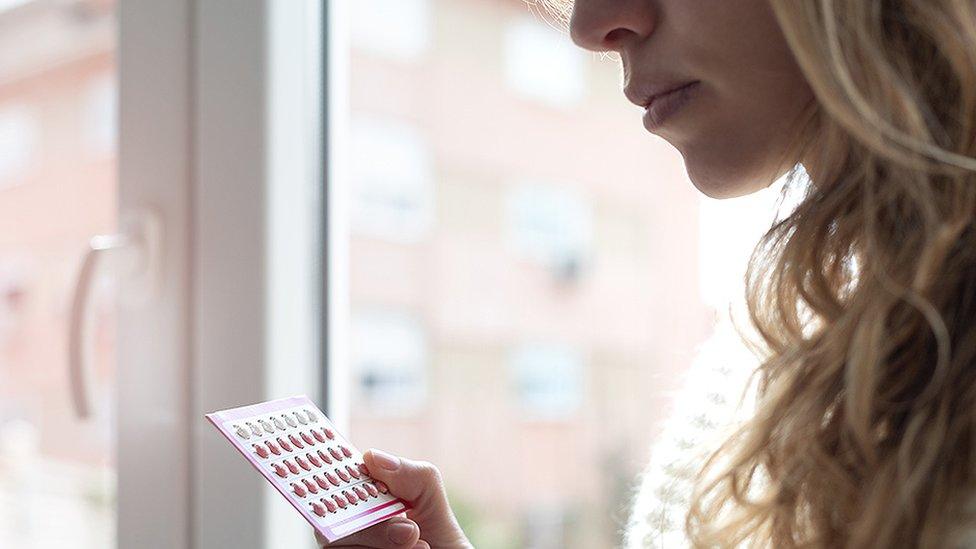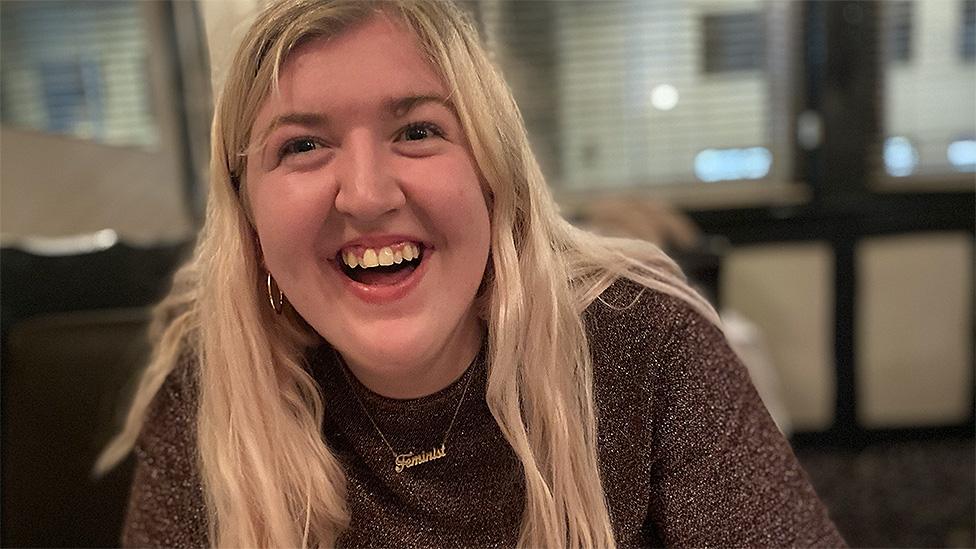Reproductive coercion: 'I wasn't allowed to take my pill'
- Published

A BBC poll suggests 50% of UK women under 45 have experienced a form of reproductive coercion
Reproductive coercion is a lesser-known type of abuse. It's when someone uses pregnancy, contraception and sex to control a person.
Examples vary, but can include forcing someone to have an abortion they don't want, damaging or hiding contraceptives and pressurising someone not to use condoms.
To find out how common it is, the BBC commissioned a survey of 1,000 UK women aged 18-44 - and found that 50% said they had experienced at least one type of reproductive coercion.
Carried out by Savanta ComRes, external, a third of women who completed the survey said they'd experienced pressure - and a fifth said they'd been forced - to have sex without contraception.
This is the most common form of reproductive coercion, according to the survey.
Excuses like 'condoms don't fit'
One in ten women surveyed said they'd experienced someone hiding, withholding or even damaging their contraception - like poking holes in a condom on purpose.
One in ten also said they'd experienced someone removing a condom during sex without consent - an act that's often called 'stealthing' - and is classed as rape under UK law. It's also a form of reproductive coercion.
Carly says this is something that's happened to her.
"I've had instances where I would say stealthing has happened, where there's been that pressure not to use something when I quite clearly said I wouldn't do anything without using [condoms]," she tells Radio 1 Newsbeat and File on 4.

Carly has experienced pressure not to use condoms from partners and believes it's 'way too common'
Carly believes reproductive coercion is a lot more common than people realise.
"I know a lot of people that have said their partner would make an excuse that condoms don't fit, or saying 'well that doesn't work for me - it doesn't have the same effect.'"
"But taking something off during sex, I think sometimes men don't understand that actually that's not OK."
So did she think it was wrong at the time?
"I think when you are in that situation, you don't necessarily identify yourself as a victim, you kind of brush it off. It becomes so normalised that people don't take it seriously".
But there are other, more extreme instances of reproductive coercion, including some where women are kept continuously pregnant by their partner.
'He controlled my whole life'
That's what happened to Maeve*. She met her partner when she was a teenager and got pregnant a few months later.
She says he was a "charmer" at first, but it wasn't long before he was controlling her - and her access to the pill.
"I'd go to the GP, and he'd come and wait in the car. I'd get a call to say 'hurry up' when I was in there," Maeve says.
As soon as she was back in the car he'd take it from her.
She says he was doing it so she was "always pregnant".
By doing this, Maeve's partner was able to control every aspect of her life - including being able to get a job.
"Every time I said I wanted to go to work or I mentioned getting a job, I wasn't allowed to take my pill," she says.
Her partner was also physically, emotionally, and sexually abusive towards her.
Maeve wants health professionals and the authorities to be more aware of this type of abuse, which is a form of coercive control.
The law was changed in 2015 to make coercive control a criminal offence, external in the UK.
'Fed up of seeing this'
Winnie Porter, 28, is a midwife specialising in women's safety at an MSI Reproductive Choices abortion and sexual health clinic, where we spoke to her.
She's very used to seeing women who are being pressured into a termination, or other types of reproductive coercion.

Safeguarding midwife Winnie often sees women who are being pressured into an abortion
"I hear the same things and I hear the same techniques that people are using to try and coerce women into having abortions, into not having abortions, into having contraception that they don't want."
15% of women in our survey told us they'd experienced pressure to terminate a pregnancy when they didn't want to.
'A very specific type of control'
Like Maeve, Winnie believes reproductive coercion is not well recognised among health professionals
"I'd say it's almost a bit of a blind spot for a lot of services," she says.
"It is so subtle that it almost doesn't appear, you almost don't notice it and it's only through really kind of questioning what's going on in that woman's life when you start to understand that this very specific type of control is happening."
While we are doing the interview with her at work, she gets a knock on the door.
There's a woman in the room next to us being pressured by her partner into a termination she doesn't want.
Winnie goes to chat with her and has a meeting with her colleagues. When she returns she explains what's happening.
"We're trying to determine at this point whether she's safe to go home and how she will manage the situation when she gets home.
"Unfortunately, she's just not sure. Sometimes this is a bit of a fact-finding investigation about, is there anything else we don't know about this situation?
"Right now, my job is just making decisions about what we do and ensuring that right now she's OK. She's safe."
'How often will we see this?'
Cases like this stick with Winnie when she leaves work at the end of the day.
"It's a frustration. I think it's probably the best way to describe it… just thinking I've seen it again and what can we do about it and how often are we going to keep seeing this? And when is anything going to change?"
No data is currently recorded by the NHS or Police for reproductive coercion, and it's not something most health professionals routinely ask about either.
* names have been changed to protect the identity of our contributors
You can listen to the full episode of File on 4's 'Controlling My Birth Control' on BBC Sounds.
If you've been affected by any of the issues in this article you can visit BBC Action Line for more information.


Follow Newsbeat on Instagram, external, Facebook, external, Twitter, external and YouTube, external.
Listen to Newsbeat live at 12:45 and 17:45 weekdays - or listen back here.
Related topics
- Published27 July 2021

- Published11 December 2021

- Published8 February 2021

- Published25 June 2020

- Published11 June 2020
